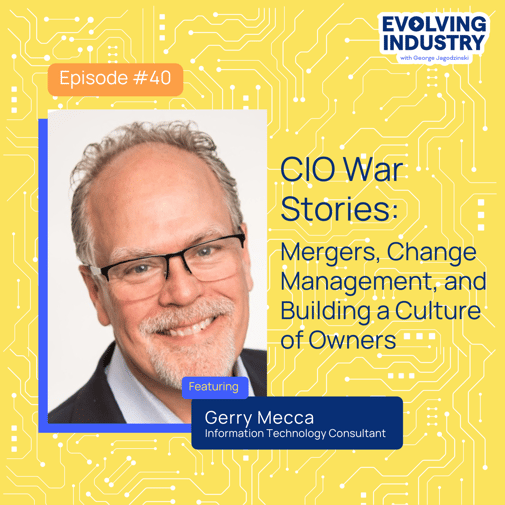Evolving Industry
As information technology integration in many businesses and nonprofits continues to escalate, so too do expectations for IT specialists.
From rapid innovation to corporate mergers, “chaotic” might be a fitting label for IT life as we venture into a new age of AI.
How do CIOs keep up with it all?
To answer that question, we sat down with Gerry Mecca. Over the last few decades, Gerry has served as the CIO of several big-name brands, including the Dr. Pepper Snapple Group. Today, he’s still going strong as an in-demand IT consultant.
We talked with Gerry about:
- Unraveling IT systems in a merger about-face
- Cutting a team’s teeth on abrupt change
- Building a culture of ownership that stays the course
Flexibility Will Help You Overcome Technical Hurdles
M&A integrations can be a messy business, especially when the unexpected inevitably rears its ugly head.
In 2005, Gerry faced one of the most interesting challenges of his career, a merger between Dr. Pepper bottling and Dr. Pepper/Seven Up. One was the drink concentrate and brand owner, while the other was the bottler and distributor.
The deal closed in 2006, but shortly after, Gerry's team was met with a twist when executives from their parent company, Cadbury Schweppes, decided to split the newly merged company.
“The corporate raiders came in and said, ‘You know what? We don't like this Cadbury deal,’ Gerry said.
So now, he and his team had to suddenly throw their entire IT integration between the two companies in reverse.
“The technical hurdle was massive,” he said. “Here we are going and shoving all this together, and about the time the surgery and sutures had started to heal, we were going back in and cutting back the brain out and splitting it in half.”
To top it all off, the parties involved now had to figure out who was responsible for what. But eventually, common sense prevailed.
“Everybody came together and worked on their own piece while they made sure that nothing I was doing was messing up their life and nothing they were doing was messing up.”
Gerry acknowledged that not every step in the process went as anticipated, and that’s why it’s important to stay flexible in these situations.
“You make a plan because the plans are meant to be broken. And more often than I want to admit, they also don't go according to plan,” he said.
“You’ve got to take some risk.”
Keep the Team Moving Forward Through Change
Throughout his career, Gerry found himself leading teams through abrupt changes.
Earlier in his career, he was called suddenly to help with the acquisition of Louisiana Land and Exploration, an oil and gas company. That’s when he learned to thrive on ambiguity.
“That was where I cut my teeth on how to do all these things and what's predictable and what's not,” Gerry said.
So by the time of the Dr. Pepper merger, he was familiar with the chaos that can result from massive IT endeavors. How’d he pivot that experience toward guiding his team?
“Some of it would be inspiration, and just coaching them. [Another] would just be track record,” he said. “By this time, 2005, I'd been an IT leader for a long enough time and had a few skins on the wall.”
While he appreciates all the digital tools available to IT professionals today, he thinks those early experiences made him and his teams more agile.
“I wish I had all the bots and tools that I can do to simulate now [what] I didn't have back then,” he acknowledged. “But that only readies you and gives you an appreciation for what the heck we can do today if we need to.”
Long-Running Initiatives and a Culture of Ownership
Sometimes, a leader’s greatest challenge is keeping everyone aligned when a goal seems out of reach.
"Every time you have something you're doing that doesn't drive value to the ownership, and you reduce your invested capital and operating expenses, you're reducing the value," Gerry said.
He alluded to one of his other experiences while he was with PepsiCo, who just sold Tropicana and several of its other brands to a private equity firm.
“There were some unique technologies that were built to bridge the gap between what Pepsi was doing and what Tropicana was doing, and those things, they're hugely important [that they] be done right.”
Getting everyone on board during this huge transformation required a mindset shift.
“The more we could push out of people's minds [this idea], ‘Well, when we were with Pepsi, it was this way, or it used to be this way,’” he said. “That rallying call, that we can be different and we can be agile, and we can make this happen, built a culture of owners.”
By demonstrating the value of what they were doing, Gerry and his fellow leaders cultivated a culture of ownership among their peers.
“At the end of the day, it's not all about the money,” he argued. “It's looking and seeing that if we just spent the money properly, we would be in all these other outlets, and we'd be able to do all these other things. And that became a pretty easy story to motivate people.”
Craving more? You can find this interview and many more by subscribing to Evolving Industry on Apple Podcasts, on Spotify, or here.
